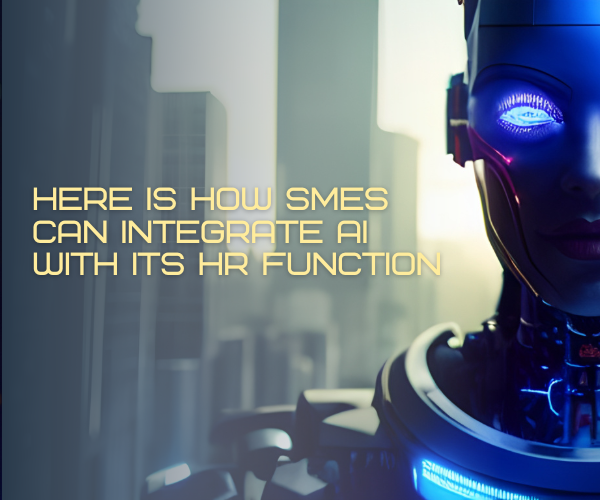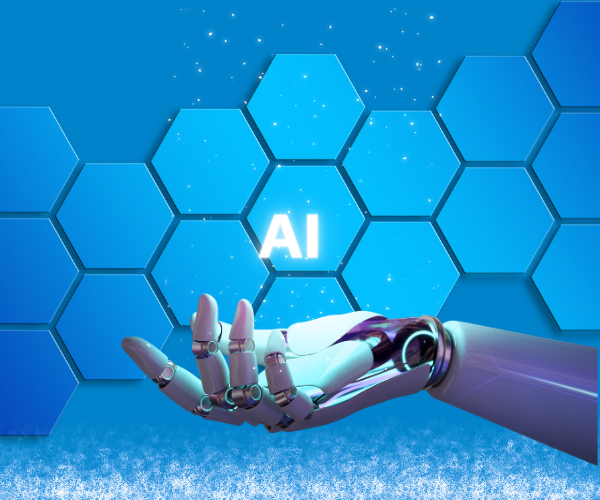By M MUNEER
-----------
While AI can help to automate many administrative duties, it should never replace the human touch, which is essential in developing strong relationships with staff. HR will continue to play an important role in promoting a pleasant workplace culture and supporting employee growth.

Artificial intelligence (AI) is increasingly being used in the human resources (HR) function, and this trend is expected to continue. AI is already revolutionizing HR by automating numerous time-consuming administrative activities, allowing executives to focus on strategic initiatives that drive business success. This might be a huge help to small and medium-sized firms (SMEs) who are short on quality talent.
In this column, I'll look at the growing usage of AI in HR, as well as the benefits and problems that come with it. AI provides promise for SMEs in the future.

Take, for example, recruitment. AI can be used to automate the recruitment process, from resume screening to interview scheduling. Artificial intelligence-powered recruitment software can analyze resumes and job specifications to locate the best candidates. This technology can also conduct preliminary interviews, giving HR employees with a shortlist of qualified individuals.
Another application is in employee engagement. Chatbots can be used to answer staff enquiries and provide quick answers to frequently asked questions. Artificial intelligence-powered surveys can collect employee feedback, identify areas for improvement, and highlight areas where the organization excels.
AI is also utilized to improve training and development programs. Chatbots can give training content to employees, giving them with a more personalized experience. AI can also analyze employee performance data to suggest areas that require extra training or support.
The benefits
There may be various advantages. To begin, AI can save HR time by automating administrative duties, freeing up resources for more strategic initiatives. Second, AI can assist in reducing human bias in the recruitment process, ensuring that the best candidates are chosen. Third, it can boost engagement by giving personalized experiences and soliciting employee input.
The challenges
While the benefits are substantial, there are some drawbacks. One concern is that AI will replace human employment, with some HR professionals believing their positions would be automated. Second, if the underlying algorithms are prejudiced, AI may perpetuate human biases. Finally, data privacy is a major concern, with some employees concerned that their personal information will be utilized by HR systems.
What's the future of AI in HR?
As AI advances, we may anticipate more complex HR systems that provide a more personalized experience. It can be used to predict employee turnover, allowing HR to take proactive measures to retain personnel.
However, it is critical that AI not be used to supplant human contact in HR. While technology can help to automate many administrative duties, it should not be used to replace the human touch that is essential in developing good connections with employees. HR will continue to play an important role in promoting a pleasant work culture and supporting employee development.
Here are some best practices for SMEs when integrating AI in human resources:
Ensure data privacy and security: Employee data must be kept secure and secret by SMEs. When implementing AI in HR, it is critical to adhere to best practices for data protection and security.
Avoid bias: When AI algorithms are trained on data that is not representative of the population, they can become prejudiced. HR must ensure that its AI systems are built to eliminate bias in recruitment, performance appraisal, and other HR activities.

Involve the employees: It is critical to involve employees when deploying AI in HR. They should grasp how artificial intelligence (AI) is employed in the organization and how it can assist them.
Use AI to enhance, not replace, human interaction: While artificial intelligence can automate many processes, it is vital to remember that human resources is ultimately a human-centered function. HR should use AI to improve the employee experience rather than replace it.
Continuously monitor and improve AI systems: AI algorithms must be constantly reviewed and upgraded in order to produce accurate and unbiased results.
Source: Money Control
HR1Tech - Nền Tảng Tuyển Dụng Trực Tuyến Ngành CNTT
Tìm việc và tuyển dụng ngành đa ngành. Khám phá thêm tại: www.hr1jobs.com